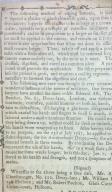[ Untitled Method of Curing Cancers / Antiscorbutic Drops for Gout ] Edward Ash
Date: The cure was effected between 23 June 1787 and 7 January 1788. This report was printed in Nova Scotia in 1789. | 1787/06/23 to 1789/12/31
Source:
Nova Scotia Calender, or an Almanack [...] by Metonicus (print)
Institution: Nova Scotia Archives
| Reference: AK.AY.N85M / No Microfilm Available
A plaster remedy for treating cancer followed by a case study attesting to the benefits of Mr.Spilsbury's antiscorbutic drops.
The following method of curing cancers, is said to be infalliable,
“Spread a plaister of diachylon with gum, upon thin leather, the size of
the cancer: suppose the plaister to be as large as a crown piece, or a Spanish
dollar, sprinkle on it a scruple of corrosive sublimate of mercury, finely
powdered; and so in proportion to a larger or smaller plaister. This plais-
ter must be applied to the cancer, and remain on it forty-eight hours; but
if there is any apprehension that it has not done its office in that time, it
must remain longer. Then, take it off and apply a poultice of bread and
milk with a little olive oil, which must be renewed frequently, until the
cancer comes entirely out, by the roots as it were. The part is then to be
dressed, digested, and cured as a common ulcer. A purge or two with
calomel must precede the application. No other preparation is necessary, un-
less the patient is gross, and requires a cooling regimen. Bark is sometimes
necessary to forward the digestion and cure.”
The following new cure was thought so very extraordinary, and such a
wonderful instance of the power of medicine, that several respectable house
keepers have attested the same -- Mr. Edward Ash, Taylor, at Mr. Cook’s
Butcher, No. 63, Drury-lane, London, was violently afflicted with a
scorbutic, corrosive, painful humour on both his hands, which almost drove
him to distraction, discharging a glutinous disagreeable coloured matter,
which caused his hands and fingers to swell so much, that for five weeks he
labored under a most calamitous situation. He could not extend his fingers
they being drawn up, neither could he dress or undress, or feed himself;
his hands were wrapped up in linen. After having taken various medicines
to no purpose, on the 23d of July 1787, he applied to Mr. Spilsbury, in
Soho-Square, for his Antiscorbutic Drops; -- by the use of which he expe-
rienced benefit in three weeks. By continuing the Drops six weeks, he
recovered the use of his hands, tho’ in a weak state; still persevering in the
medecine some weeks longer, he is this day, Jan. 7, 1788, perfectly re-
stored to his health and strength, and not a symptom of his complaint re-
mains.
(Signed) EDW. ASH.
Witnesses to the above being a true case, Mr. Alexander Robertson,
Cheesmonger, No. 122, Drury-lane; Mr. William Boak, Hosier, No
246 Holborn; and Mr. Robert Poulton, Glass-Cutter, No. 16, Upper
Union-court, Holborn.
Download: Transcription | Images
